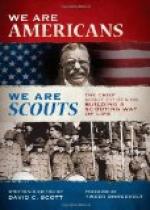When I went back to camp, I told Uncle Kit and the others of the invitation I had received and accepted. Uncle Kit said, “I guess we are too old to take a part in the dance, but we can go and look on and watch the fun.” We did not go to the Indian camp until near noon the next day; and I think there were two or three hundred white men, women and children standing around the camp when we got there, and the majority of them had never seen an Indian before.
As Uncle Kit and Bridger and Beckwith did not wish to take a part in the performance, they kept out of sight of the Indians, and I went into the camp, and as soon as I arrived the Indians commenced to form the circle for the peace smoke.
We had all just taken our seats, and the head chief was in the act of lighting the pipe when he sang out, “O Wah,” at the top of his voice, and in an instant every Indian sprang to his feet and started to run. I could not think what was the matter until I looked around and saw a man a short distance from us with a camera in the act of taking a photo of us, but he never got the picture, for not an Indian stopped running until his wigwam hid him from view.
The man with the camera looked the disappointment he felt as he came to me and asked if I were acquainted with those Indians.
He said, “What in creation was the matter with them? What made them get up and run? I would rather have given fifty dollars than miss taking that picture.”
I could scarcely answer him I was so choked with laughter. But I managed to tell him that I reckoned the Indians thought that he had some infernal machine pointed at them that would blow them all to the happy hunting grounds.
He asked me if I would go and tell the chief that the camera would not hurt them and try to make them understand what he was doing with it. He said, “If you can persuade them to let me take a photo of them, I will pay you well for your trouble.”
I told him I would try, but I was doubtful of his getting the picture.
So I went to the chief’s wigwam and tried to explain to him and to persuade him to have him and all the band sit for their pictures to be taken.
The chief shook his head and said, “Hae-Lo-Hae-Lo white man heap devil,” which meant “I will not that the white man would do them some evil,” and then he said he was afraid that the white man with the big gun wanted to kill all his warriors, and all that I could say would not change his mind.
Carson, Bridger and I staid at Denver three weeks, and then we went back to Bent’s Fort, and when we left Denver, the town and the country in every direction was covered with wagons belonging to emigrants that the excitement about gold having been discovered in the mountains had brought to Denver and the surrounding country.
We reached Bent’s Fort late in the afternoon and had not been there over an hour when three men and a boy came in on foot and brought the news that the Indians had attacked a train of emigrants and killed them all. The emigrants were on their way back east, from Cherry Creek, where they had been led to believe that gold had been discovered.




